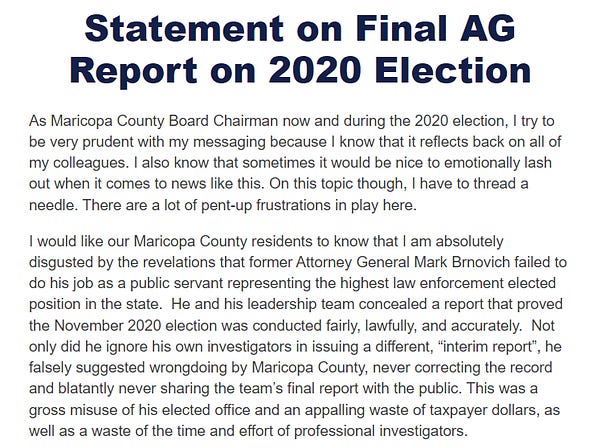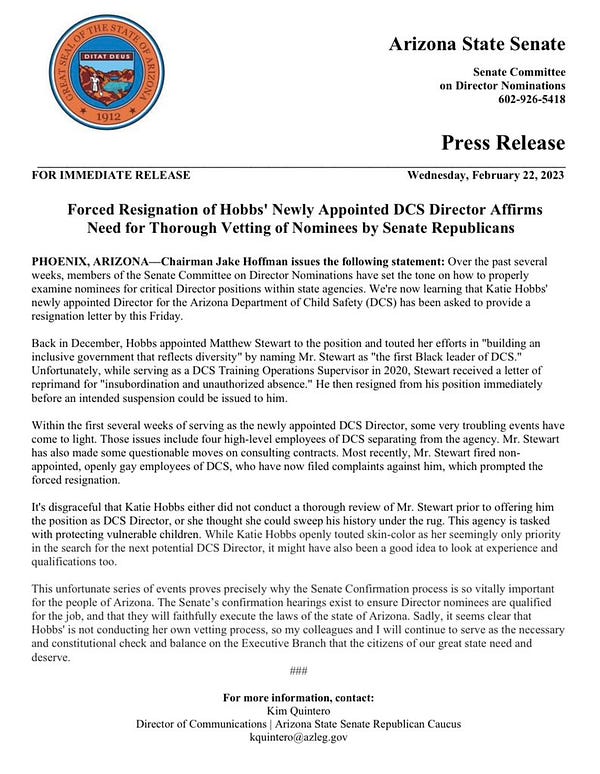The Daily Agenda: The legacy you leave behind
Remember when he had a spine? ... Congressional dominoes are falling ... And Harley is "pawsatively" too much.
Attorney General Kris Mayes released a cache of documents detailing how her predecessor, Mark Brnovich, disregarded and misrepresented his own investigators’ findings in their sprawling investigation into the 2020 election.
He effectively buried his investigators’ final word on the matter: The 2020 election was free and fair. Brnovich had refused to release the documents while he was in office.
The Washington Post’s Yvonne Wingett Sanchez and Isaac Stanley-Becker dropped the bombshell story yesterday that puts a damning bow on the legacy of one of Arizona’s most enigmatic modern politicians. The piece shows just how far from his no-nonsense roots the former AG was willing to stray in his attempt to avoid former President Donald Trump’s direct attacks as Brnovich sought the GOP nomination for the U.S. Senate race.

The Post’s story is the first real glimpse into the internal discord at the AG’s office, where career law enforcement agents spent at least 10,000 hours running down election conspiracies drummed up by the Cyber Ninjas’ audit of the Maricopa County election, only to see their work misrepresented and suppressed by their boss. The documents still leave many questions, the Post notes, but they offer an important post-mortem on Brnovich’s political career and integrity as a prosecutor.
We won’t know whether his office’s findings could have swayed public opinion on the right, if he had released them. What little he did release only made things worse. Brnovich released an “interim report” that attempted to play both sides of the issue and cast doubt on the county’s elections and cooperation with his office, which further put county officials at risk of threats and harassment.
Arizona is still in the grips of election fraud fever nearly a year after investigators declared fears of a stolen election unfounded, thanks in part to the absence of backbone from the state’s top law enforcement agent who, in service to his political ambitions, suppressed those investigators’ work.


You should really read the story and the underlying documents that the Post posted, which include a version of the “interim report” to the Senate with never-before-seen notes from his investigators debunking some of his claims while pushing back on his characterization of their other findings and a detailed internal analysis completed before that interim report that debunks some of the most rampant claims of fraud.1
The documents showed just how little evidence supported the most frequently espoused claims from election fraud profiteers and elected officials. The investigators looked into 430 complaints, finding just 22 worth of prosecutorial review, the Post wrote.
Elected officials like Mark Finchem and Arizona Sens. Sonny Borrelli and Wendy Rogers failed to produce evidence that backed up their public postures. Rogers, for her part, refused to even talk to the investigators, saying she was waiting for “perp walks” for supposed crimes she wouldn’t help the AG investigate.


Running for U.S. Senate put Brnovich in a lose-lose situation. Every incentive pushed him to validate election fraud conspiracies to save his flailing U.S. Senate race and appease the far-right flank that he needed to win the GOP primary.
As the state’s top prosecutor, he was in a position to give the Republican base the perp walks they demanded for the hijacked the 2020 election. Except he knew the election wasn’t hijacked. Finding just one smoking gun would have almost certainly salvaged his flailing campaign. As the Post story shows, he tried his damnedest to find that smoking gun — and he came up empty.
For his part, Brnovich still hasn’t spoken publicly about exactly how his former posture as a straight-talking Republican not afraid of his own party changed so drastically on his way out of office, even after it was clear he lost his bid for the Senate. In response to the documents released yesterday, he tepidly defended the work of investigators who faced scrutiny from all sides.
But we deserve much more than a canned statement from him. If he can channel his former self, we all have questions about the last year and a half of his administration. He owes the people who paid his salary some answers.
Don’t everyone leave at once: With U.S. Rep. Ruben Gallego gearing up for a run at U.S. Sen. Kyrsten Sinema (or for her vacant seat), Phoenix City Council members are making moves. Yassamin Ansari, Laura Pastor and Betty Guardado are all mulling runs for Gallego’s seat, which, along with this spring’s runoff elections, could mean a massive shakeup for the council, the Republic’s Taylor Seely reports.
That argument sounds familiar: Now that a Democrat controls the Attorney General’s Office and its $500,000 budget for the election fraud unit, Republican lawmakers are calling the unit politically motivated, just as Democrats did when former AG Mark Brnovich ran it, Votebeat’s Jen Fifield writes.
“Without a script for what it’s supposed to do, the Election Integrity Unit is at the whim of the politician who runs it. And given that the attorney general already has the power and resources to investigate criminal voter fraud and voter intimidation even without the unit, both sides have questioned whether it should exist at all,” Fifield writes.
That plan seems shaky: Scottsdale and the Rio Verde Foothills may be inching closer to a deal to get water to the unincorporated area after the city turned off its taps in early January. The Arizona Capitol Times’ Camryn Sanchez writes that the Scottsdale City Council unanimously supported a resolution Tuesday that expresses support for a loosely defined plan to get water from a third party, such as a tribal government.
Better than call centers: The New York Times declares Arizona the center of semiconductor manufacturing and chips. As the federal government unleashes a “once-in-a-generation gusher of federal funding” to recenter high-tech manufacturing in the U.S., Arizona is primed to take advantage of that funding, the Times notes, in large part because of the work of former Gov. Doug Ducey. But separately, the Times notes that plans for top chip manufacturer Taiwan Semiconductor Manufacturing Company to expand a plant in Phoenix are caught up in international tension and mired by cultural differences.
Procedure matters: The U.S. Supreme Court sided with an Arizona man who was convicted of murdering a Tucson cop in 2003 and sentenced to die. John Montenegro Cruz argued his lawyers should have been able to tell the jury that he would be ineligible for parole if they voted for a life sentence. Several jurors said they would have sentenced him to life if they had known, the New York Times wrote.
You hear that, lawmakers?: Secretary of State Adrian Fontes co-wrote a column in Newsweek with his Michigan counterpart, Jocelyn Benson, saying now is the time for policymakers to strengthen their systems and confidence in their systems with “pro-democracy changes” like universal voter registration and no-excuse mail voting ahead of the 2024 elections.

Good gig if you can get it: The Arizona Senate is paying election conspiracy superspreader Gina Swobada $15,000 per month as a contract employee for Sen. Wendy Rogers’ Elections Committee, Dillon Rosenblatt reports on his Substack, Fourth Estate 48. If the four-month contract were extended for the full year, she would be the second-highest paid employee at the Senate, all without actually being an employee, which Rosenblatt notes blurs the lines of whether her work is considered public record.
Gigs nobody wants: Despite a $15 million investment in the Community Assistance Program aimed at creating behavioral health units to help people having mental health crises, the City of Phoenix has only been able to activate one out of its nine planned units because it can’t find employees, KJZZ’s Christina Estes reports.
We’re all just trying our best: Substacker Robert Robb calls for amnesty for all COVID-19 policymakers, saying while he disagreed with the approach from Dr. Theresa Cullen, the former Pima Health Department director who lawmakers rejected as Gov. Katie Hobbs’ Department of Health Services director, Cullen, like many others, was doing her best against an unfamiliar virus.


It’s scary out there, border edition: Prosecutors say the rancher accused of killing a migrant on his property in Santa Cruz County ambushed a group of migrants and shot his victim in the back without warning, Angela Gervasi writes in the Nogales International. That account is based on eyewitness statements. Separately, Gervasi notes that the rancher, George Alan Kelly, is facing additional charges of aggravated assault against two other victims.
In case you’d rather listen: Hank spoke to KJZZ’s “The Show” yesterday about Hobbs’ decision to fire everyone on the Arizona-Mexico Commission and restack it with her own picks.





